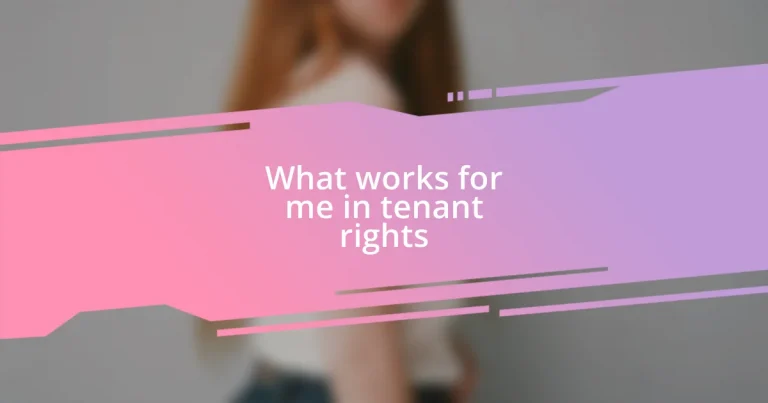Key takeaways:
- Tenants have key rights, including the right to habitable housing, privacy, and timely repairs, which empower them to advocate for their living conditions.
- Effective communication with landlords, including being clear in requests and maintaining a written record, can significantly improve tenant-landlord relationships and facilitate resolutions to issues.
- Involving local advocacy resources and understanding legal rights can provide tenants with the support and knowledge needed to navigate disputes and assert their protections effectively.
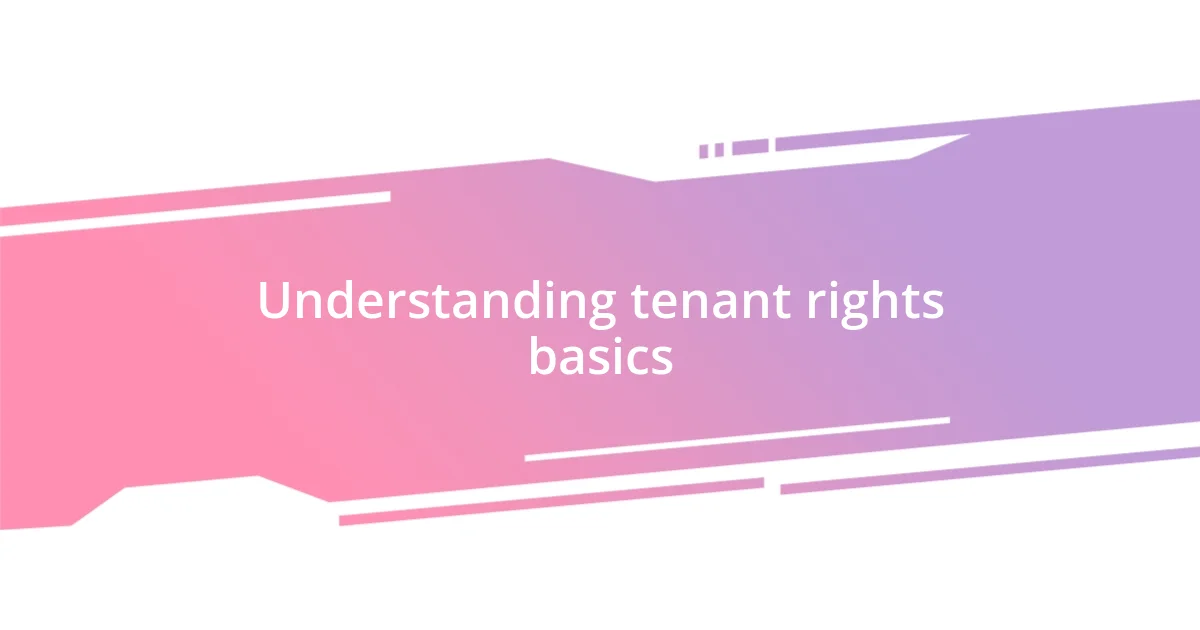
Understanding tenant rights basics
Understanding tenant rights is essential for anyone renting a home. I remember my first experience as a tenant; I felt overwhelmed by the lease agreement and the rules set by the landlord. It struck me how important it was to know what rights I had to feel secure in my living situation.
One basic yet crucial tenant right is the right to habitable housing. This means that landlords must ensure their properties are safe and livable. Have you ever walked into an apartment with peeling paint and a leaky faucet? It’s frustrating when basic living conditions aren’t met. I’ve experienced a situation where my heating broke in mid-winter. Knowing my rights empowered me to insist on immediate repairs—nobody should endure the cold unnecessarily!
Additionally, tenants have the right to privacy in their homes. It’s startling to think that a landlord could just walk in whenever they please. I recall a time when I received an unexpected visit from my landlord, and it made me realize how critical it is to establish clear boundaries. Have you discussed with your landlord how and when they plan to enter your space? This conversation can foster a respectful tenant-landlord relationship and ensure your comfort and privacy are maintained.
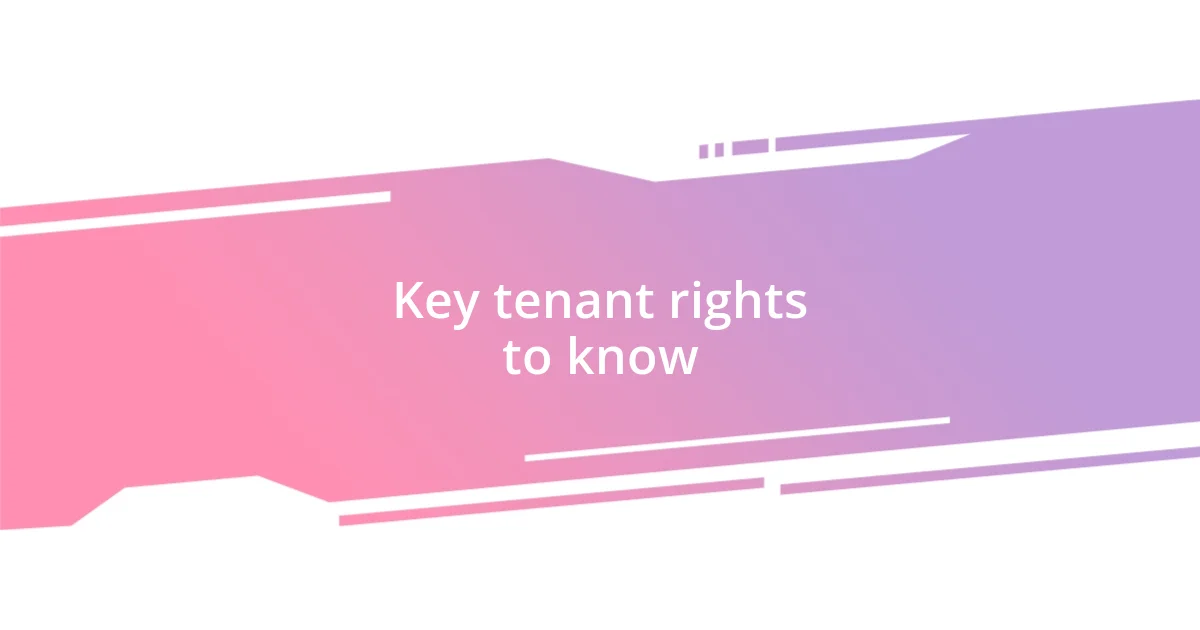
Key tenant rights to know
One key tenant right that often goes unnoticed is the right to have repairs made in a timely manner. I remember living in an apartment where the bathroom faucet dripped incessantly. It was more than just a nuisance; it wasted water and increased my bills. After a few initial requests fell on deaf ears, I learned that tenants are entitled to prompt repairs for issues that affect their quality of life. Standing my ground not only resolved the issue but also taught me that being proactive about my rights is essential.
Knowing your rights can make a significant difference in your rental experience. Here are some key tenant rights to keep in mind:
- Right to a habitable living environment: Your home should be safe and livable, with essential repairs made promptly.
- Right to privacy: Landlords must give notice before entering your home, preserving your personal space.
- Right to fair treatment: Protection against discrimination based on race, gender, or family status is a fundamental right.
- Right to warning before eviction: Tenants must receive proper notice before eviction proceedings begin, allowing time to prepare.
- Right to having security deposits returned: You should receive your security deposit back, minus any legitimate deductions, when you move out.
These rights empower tenants to advocate for themselves and create a more pleasant living experience.
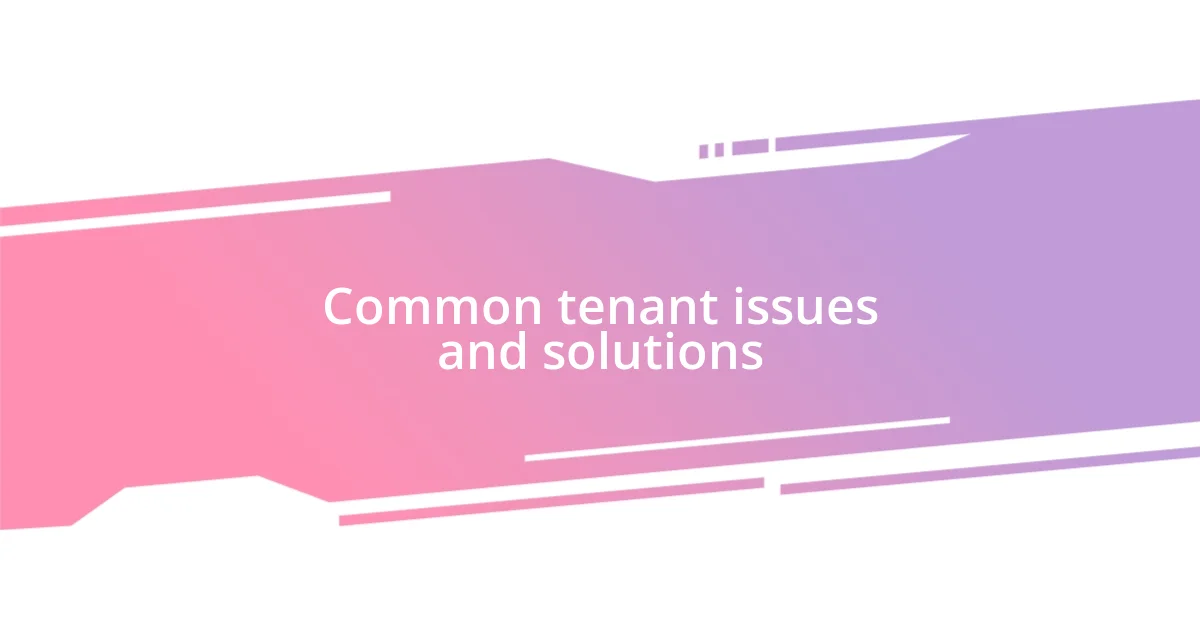
Common tenant issues and solutions
As a tenant, one common issue I faced was dealing with noisy neighbors. I remember nights spent tossing and turning, my sleep disrupted by loud music or shouting. It’s disheartening to feel uncomfortable in your own home. To tackle this, I learned the importance of addressing it directly but respectfully with my neighbors first. If that didn’t work, I documented the disturbances and reached out to my landlord, who was surprisingly receptive. It’s a lesson that open communication can often lead to a smoother resolution.
Another prevalent issue is the timely return of security deposits. Once, after moving out, I found myself anxious about whether I would receive my deposit back. I meticulously cleaned the apartment and documented its condition. When the landlord initially withheld part of my deposit for “cleaning fees,” I presented my evidence and reminded them of my rights. Trust me, knowing how to properly defend my case made all the difference in getting my money back.
Now, let’s look at some common tenant issues and the relevant solutions that can help streamline the process.
| Common Issues | Solutions |
|---|---|
| Noisy neighbors | Communicate directly with them first; escalate to landlord if unresolved. |
| Security deposit disputes | Document property condition; discuss discrepancies calmly, citing rights. |
| Repairs not made | Send written requests; know your rights to a habitable space. |

How to effectively communicate with landlords
When communicating with landlords, clarity is crucial. I learned this firsthand after facing confusion over a maintenance issue. Instead of sending vague requests, I started being specific, clearly stating the problem and what needed to be fixed. This not only helped my landlord understand the situation better but also showed that I was organized and serious about my request.
Another effective strategy is to keep a record of all communications. I remember a time when my landlord forgot about a promised repair. By having a written trail of our conversations, I could refer back to our agreement. This not only reinforced my position but also made it harder for them to dismiss my concerns. How can you expect your landlord to take you seriously if there’s no evidence of your requests?
Lastly, I found that showing appreciation can go a long way. When my landlord responded positively to my requests, I made it a point to express gratitude. It created a more amicable relationship, and I noticed they were more willing to assist in the future. How often do we think about the impact of positivity in our interactions? A little kindness can foster a sense of collaboration, making it easier to navigate issues together.
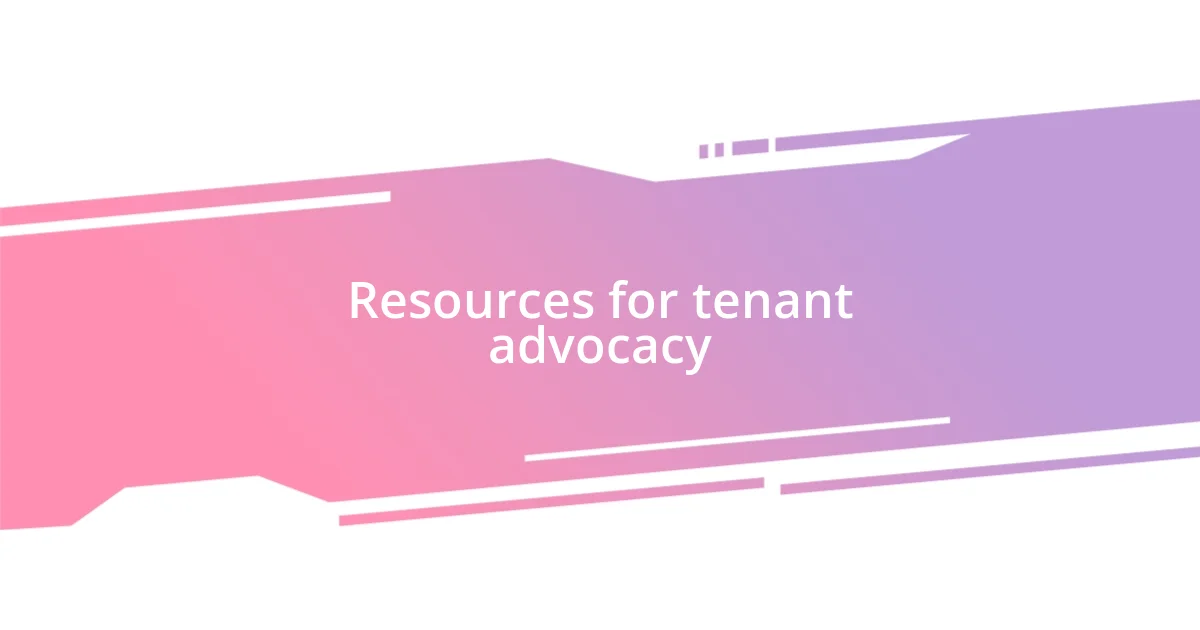
Resources for tenant advocacy
When it comes to tenant advocacy, connecting with local organizations can be a game-changer. I once attended a workshop hosted by a tenant rights group, and it opened my eyes to resources I had no idea existed. By learning from advocates who truly understand the law, I felt empowered to navigate my rights better. Have you ever felt overwhelmed by the legal jargon? Finding knowledgeable allies can make all the difference.
Another valuable resource is online platforms that provide information tailored to your specific state or city. I remember using a website packed with downloadable guides and templates, which streamlined the process for me when I was drafting a complaint to my landlord. It’s like having a roadmap; it reduces the uncertainty that often comes with asserting your tenant rights. Plus, the forums on these sites can be a great way to hear firsthand experiences from others who’ve walked this path. Isn’t it reassuring to know you’re not alone in this journey?
Lastly, don’t underestimate the power of community forums or tenant unions. Joining a local group not only offers support but can amplify your voice on issues that matter. When I participated in a rally advocating for better housing policies, I felt a sense of solidarity with others who shared my struggles. Advocacy feels less daunting when you’re part of a collective movement, doesn’t it? It’s a reminder that together, we can push for change and truly make a difference in our communities.
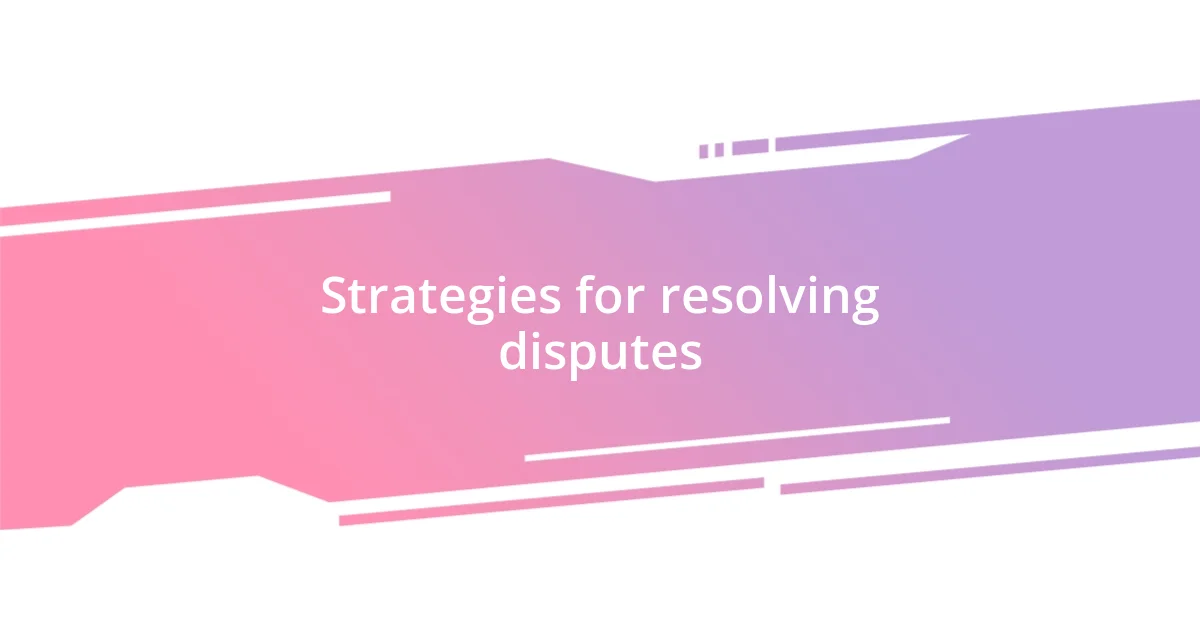
Strategies for resolving disputes
When disputes arise, one effective strategy is to approach the situation with a problem-solving mindset. I recall a disagreement over my security deposit that initially left me feeling frustrated and powerless. Instead of escalating the issue with anger, I calmly sat down with my landlord to discuss the specifics. This open dialogue not only helped us clarify misunderstandings but also fostered a cooperative environment, which ultimately led to a fair resolution. Isn’t it interesting how maintaining composure can lead to better outcomes?
Another tactic I’ve found helpful is to involve a neutral third party when talks stall. There was a time when my attempts to negotiate were met with resistance. After reaching out to a local mediation service, both my landlord and I were able to express our concerns in a structured setting. It felt liberating to have someone facilitate the conversation, allowing us to see each other’s perspectives. Don’t you think having that extra support can really change the dynamic of a tough situation?
Lastly, staying informed about your rights can empower you immeasurably. I once came across a lesser-known law regarding tenant rights in my state that proved invaluable in a dispute over utilities. Armed with this knowledge, I not only felt more confident in my stance but also was able to effectively communicate my rights to my landlord. Knowing the legal framework creates a sense of security, doesn’t it? It’s like having an added layer of protection in your corner when standing up for yourself.
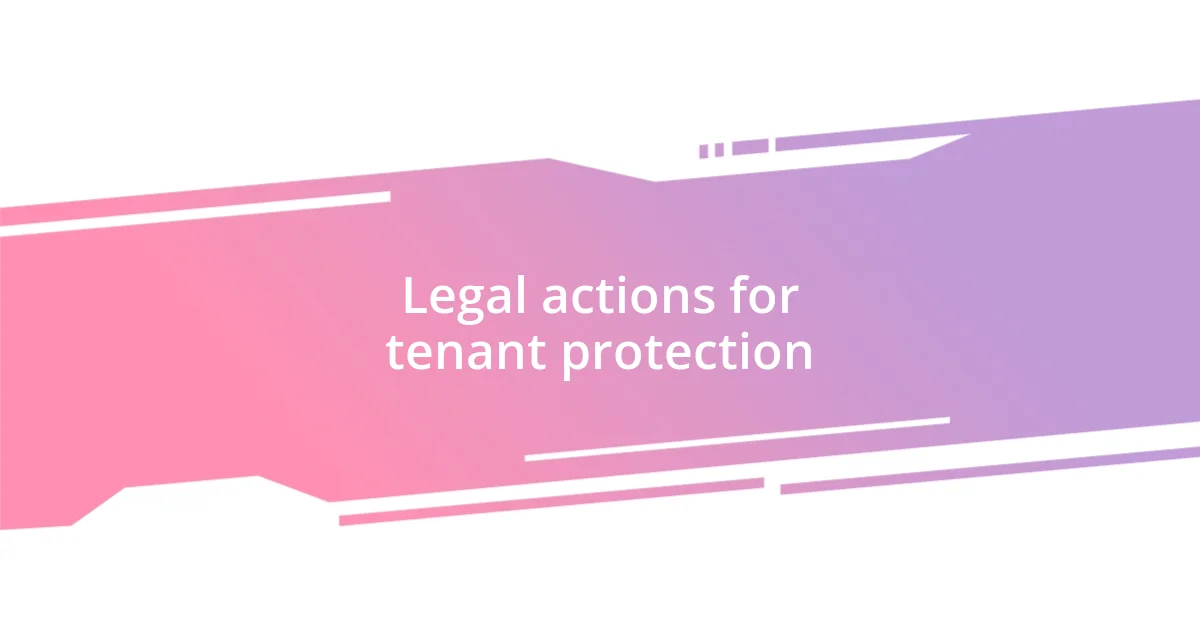
Legal actions for tenant protection
Taking legal action can sometimes feel like a daunting step, but it’s often necessary to protect yourself as a tenant. I remember standing in line at my local courthouse, feeling the weight of frustration wash over me as I prepared to file a complaint against my landlord for failing to address serious maintenance issues. The moment I stepped up to the counter and handed over my documents, a sense of empowerment took over. Hasn’t there been a time when you’ve felt that rush of taking control of your situation?
Should things escalate beyond informal discussions or mediation, knowing how to file a lawsuit is crucial. I had to navigate this daunting process myself when a neighbor’s loud music significantly disrupted my peace. I consulted a legal aid service, which was incredibly illuminating. With their guidance, I learned how to present my case clearly, which made all the difference in the outcome. It’s amazing what a little knowledge can do to transform your experience from overwhelming to manageable, isn’t it?
Finally, exploring tenant protection laws specific to your area can illuminate options you might not initially consider. When I discovered a local law that mandated timely repairs, it was like uncovering a hidden gem in the legal landscape. I gathered the necessary evidence and presented my case confidently, feeling a surge of hope as I did. It’s refreshing to think how awareness of these laws can turn what feels like a one-sided battle into a fair fight. Don’t you think understanding your rights is essential in this journey?












